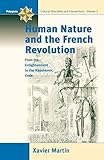Human Nature and the French Revolution : From the Enlightenment to the Napoleonic Code / Xavier Martin.
Material type: TextSeries: Polygons: Cultural Diversities and Intersections ; 3Publisher: New York ; Oxford : Berghahn Books, [2001]Copyright date: ©2001Description: 1 online resource (304 p.)Content type:
TextSeries: Polygons: Cultural Diversities and Intersections ; 3Publisher: New York ; Oxford : Berghahn Books, [2001]Copyright date: ©2001Description: 1 online resource (304 p.)Content type: - 9781571814159
- 9781782381709
- 128.094409033
- BD450
- online - DeGruyter
| Item type | Current library | Call number | URL | Status | Notes | Barcode | |
|---|---|---|---|---|---|---|---|
 eBook
eBook
|
Biblioteca "Angelicum" Pont. Univ. S.Tommaso d'Aquino Nuvola online | online - DeGruyter (Browse shelf(Opens below)) | Online access | Not for loan (Accesso limitato) | Accesso per gli utenti autorizzati / Access for authorized users | (dgr)9781782381709 |
Frontmatter -- Contents -- Foreword -- Notes on Translation -- Abbreviations -- 1. Human Nature -- 2. Helvétius and d’Holbach -- 3. Voltaire -- 4. Rousseau -- 5. Pedagogy and Politics -- 6. Mirabeau and Sieyès -- 7. The Audacity of the Philanthropists -- 8. Robespierre -- 9. Making an Impression -- 10. Cabanis and Destutt de Tracy -- 11. La Réveillière-Lépeaux and Leclerc -- 12. Supervised Sovereignty -- 13. Madame de Staël and Constant -- 14. Bonaparte: Idéologue? -- 15. The Napoleonic Code -- Conclusion -- Bibliography -- Index
restricted access online access with authorization star
http://purl.org/coar/access_right/c_16ec
What view of man did the French Revolutionaries hold? Anyone who purports to be interested in the "Rights of Man" could be expected to see this question as crucial and yet, surprisingly, it is rarely raised. Through his work as a legal historian, Xavier Martin came to realize that there is no unified view of man and that, alongside the "official" revolutionary discourse, very divergent views can be traced in a variety of sources from the Enlightenment to the Napoleonic Code. Michelet's phrases, "Know men in order to act upon them" sums up the problem that Martin's study constantly seeks to elucidate and illustrate: it reveals the prevailing tendency to see men as passive, giving legislators and medical people alike free rein to manipulate them at will. His analysis impels the reader to revaluate the Enlightenment concept of humanism. By drawing on a variety of sources, the author shows how the anthropology of Enlightenment and revolutionary France often conflicts with concurrent discourses.
Mode of access: Internet via World Wide Web.
In English.
Description based on online resource; title from PDF title page (publisher's Web site, viewed 25. Jun 2024)


